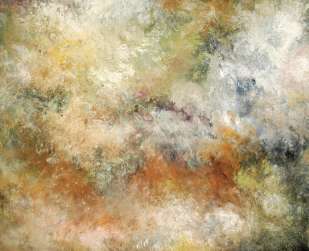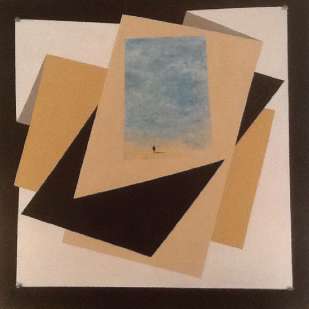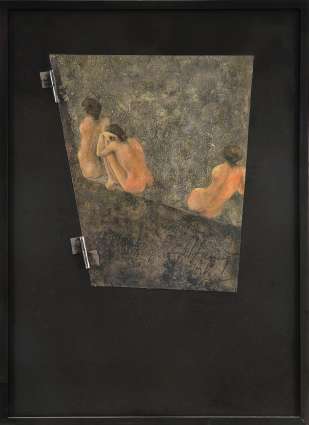Servicios Personalizados
Revista
Articulo
Indicadores
-
 Citado por SciELO
Citado por SciELO
Links relacionados
-
 Similares en
SciELO
Similares en
SciELO
Compartir
Revista argentina de cardiología
versión On-line ISSN 1850-3748
Rev. argent. cardiol. vol.83 no.3 Ciudad Autónoma de Buenos Aires jun. 2015
Illustration
A orillas del tiempo
Maria Cristina albani
(Contemporary argentine plastic artist)
By observing the work of Maria Cristina Albani we infer that existentialism was not a trend, but a rupture with the reality imagined and established by man. The artist may travel that surreal way that goes from the subter-fuges of the mind to collide with reality always waiting outside the self; however, inevitably its content disen-gages from the metaphysical and displays the Sartrean concept that "existence precedes essence". The artist's philosophical determination of life leads her to say "life is meaningless"; "the disadvantage of man is not knowing the origin and acknowledging a certain death, a contrast that deepens tragedy" or " we only exist in the present". The creation I see travels the road from a core exempt of fraud in the vision of existence to undress a symbolic world, in which no one seems to notice what reality is. So her work is bold and daring, a genuine approach -cruel for life illusionists -to the reality of the "existent" in pos-ing the question concerning man. She understands that the self´s problem can be reformulated to the limit of one's consciousness, the one that leads him from self to man.
That confrontation between the logical validity of ex-istence and the psychological insight is found in Albani. She does not cease to claim that the real world (logical) is inflexible in its transformation purposes. She does not follow man's psychological imagery of feeling unthreat-ened by change. This alienation of being-a man of two worlds, which characterizes his own animal condition evolving towards a conscience, does not justify a meta-physical or opportunistic view of life. In a deep and ancestral fear of not knowing his existential sense reside these alienations that allow him to endure with Eros' and survival instinct. Psychic life lacks temporality, logic life has a historicity. Facing that cross junction man finds his alienation to support the drama taking place in his conscience. The self carries out an existence that comes from what being is (in its action) but ignorant and de-tached from a meaning he does not know. Then he replies with fear and driven by the instincts established by the natural order.
All this pictorial artistic thought, obviously cannot solve through the symbolism of painting the meaning of the self (minor tragedy) but carries, by reaching the human scale, the inevitable question raised by philosophy: What is man? , which we can improve by adding: Why consciousness? Sartre would leave us "consciousness is a void in the self”. The greatest damage from this trag-edy inevitably ends in aporia. Man is an approximation of physical, developmental, existential and metaphysi-cal definition, constituting starting points to a question that is complex but cannot be answered. He always lies in the same starting point. There only remains to “think of oneself” in order to seize the self in the sense of action within the vitality of his conscience. Before and after be-longs to a playful or illusory behavior of nature.

"Prelude to memory" Acrylic, 90 x 1200 cm

"Juan in time" mixed technique, acrylic and gel pen, 120 x 120 cm

"Permanence in the time of uncertainty"" mixed technique on wood, paper and charcoal, metal hinges, 100 x 130 cm
Albani emits a deep cry. Why a god of the many exist-ing has never appeared in all its magnitude in the land of men? Why is all its magnificence far from our senses, knowledge, faith and even from our fears? Muddled with so much pain and death we have grown accustomed to being part of this wholeness which is nothing, because this wholeness is meaningless. Have the gods not seen the human effort to endure despite being condemned from birth? Man has exhausted his heart. Tired of beg-ging to heaven, he charges his frustration on his peers. He tries to be something, to explain, to discover himself in the all-consuming and forgetting fire. At least to take revenge on the enjoyment of the senses before they get lost in the flesh putrefaction. In the presence of so much unpunished injustice he no longer looks to the heavens in pursuit of an explanation; only the ones that fear take refuge in the abyss of the heights despite their own earthly weariness. Most attempt to be earthly gods upon the experience of the most fragile beings. To decide on Earth over the life and death of others.
Man seeks his future. He ignores that an instant is all the instants jointly. They fit in the palm of the hand. In that task resides his inherent existential disease. He tries to place time, his executioner, within the subjectivity of that future that is a raid on his fiction. He knows that everything is nothing, but he will be unable to resign to his madness and remain only with clairvoyance; and in his alienation to undertake death with his own judgment. It is a suicide he eludes in search of the reason that disap-points him, turning his dignity unspeakable.
While retreating from her work, Maria Cristina Al-bani left me an "I'll see if I stroll in another rhythm of colors .... I want a change ... I'll see how I look in front of the canvas, what it expresses ... because it tells me what it wants me to paint ... And all I do is obey according to my own instincts ... "
Sometimes, when I withdraw from the mundane, from its jail to feelings, I reach my skepticism; I fill with empti-ness and then my "ego" blossoms without inhibitions or fears. He offers himself to the light of reason without the guilt that comes from the bizarre. From the accidental origin of man which he transmits to his offspring. Those storms of anger and conflict no longer hit me, they can float without my feeling a toy to man and his vices, with-out realizing that time touches me with his victimizer's stalking. I become yet another slip of the secret, the imperceptible not questioning the feeling of cosmos, but ac-companying it. I feel I am whole, that there is no divorce between myself and man, between reason and feeling, be-tween consciousness and emptiness. The heart seems to escape his bone cage to guide me through the paths of un-reason, the real free paths where erring is to find oneself and feeling death, to understand. In that state I can let go of any attachment to affection and guilt. I realize I am the emptiness transformed without ever reaching a definitive self. So, I feel I could die over and over again until I get tired of doing so and wish a new life, but how horrible is the oblivion of consciousness in the transformation!
Jorge C. Trainini














